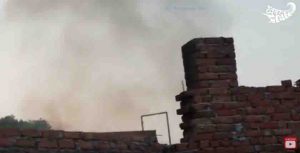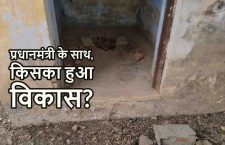An unlicensed tyre factory in Faizabad running for years, has recently come under the scanner. But, for the citizens of the hamlet nearest to it, the question remains: Is it already too late?
Khabar Lahariya’s Faizabad reporter Kumkum Yadav runs her thumb across a blade of grass in a remote hamlet and sticks it out. Her phone camera records the evidence – her thumb is black, sooty and grimy. This is a result of the fumes that travel from the factory nearby, which have settled like a grim blanket over the fields. A death threat that hangs in the air like a dull black cloud. Or a ticking time bomb if you prefer.
According to the Environmental Act of Uttar Pradesh, chemical plants and factories cannot discharge untreated sewage into the water bodies or land around it. Something that the Lata Chemical Factory, located in Bikapur Block’s Girjapur Pandey ka Purwa in Faizabad, is in clear violation of.
The factory manufactures tyres we learn and according to the villagers, the oil that’s produced from burning of defective pieces is responsible for the thick, black fumes that spew out of the premises and into their lives. The dire health hazards and effects are felt across 10 surrounding villages, the purwa’s residents tell us, although their own proximity to the plant means that they’re the ones who’re most adversely impacted.
The factory was established in February 2017, and in the last two months, the effects have been apparent, urging the locals to finally decide that enough is enough. Asha’s testimony is around metabolism and the “zahar” that is their daily life, “Khaana hajam nahi hota hai. We all suffer from chronic pain in our stomachs.” She’s referring to the layer of dust that settles on their food and the vegetables she cuts and readies for cooking. Plus, the children are developing boils and sores on their bodies and scalps, she informs us. She’s quick to show us the “daane” on the head of the child she’s holding in her arms, through the course of our interview.
Our attempts to source official quotes from the factory owners yield no results – the spokesman, we’re told, has been on leave. Ramashankar Tiwari, the village pradhan clues us in, “Earlier, we were told a steel factory is being planned here. Then, we got to know it’s a tyre factory. They’re burnt and the chemicals that are released flow out into the areas around. It’s causing crop damage, and slowly rendering the fields impossible to cultivate. Fasal ugaai nahi ja rahi. 8-10 quintals of wheat were being produced here, quite easily. And, in today’s date, it’s barely 2. Can you imagine the loss we’re facing?” He pauses and adds, “We need this factory to shut down immediately.”
Due to lack of initiative and action from officials and a sense of apathy that came their way from the plant, locals set off on the investigation themselves. What Rishabh, a Girjapur Pandey ka Purwa resident calls “karavahi”. He, alongwith other young men from the hamlet, then followed it up with protests. Ankit, his mate, who’s been facing “severe lung problems” as a result of the fumes, and has been a part of the “dharna-pradarshan” organizing committee also shares with us stories of intimidation. They’ve all faced it from unnamed local dabangais he has reason to believe are company reps, “Maar denge, yeh kar denge, woh kar denge, they say stuff like that to us”, he says.
The first official protest was on June 10, and since then the last month has seen some action. After the June protest, which also became Kumkum’s story lead, the SDM Vijayendra Kumar promised to have the factory shut down citing a lack of license.
Our investigation however revealed that it had been revoked over a year ago, on paper, due to lack of adherence to guidelines.
But the SDM refused to grant us an audience, for an official interview to follow this up.
Meanwhile, the people of Girjapur Pandey ka Purwa plan stronger protests, hunger fasts, and stubbornness in the face of threats.
-Pooja Pande
This Khabar Lahariya article first appeared on The Wire.


